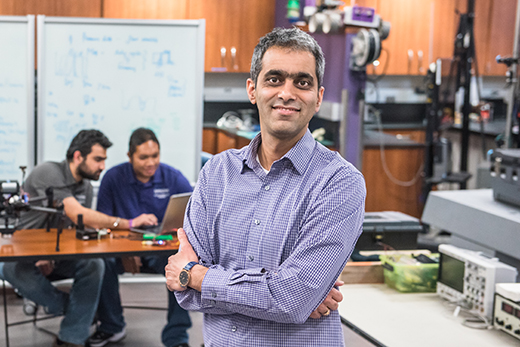USDA funds technology research for optimum production from better, smarter planting
Thursday, July 23, 2020

Ajay Sharda, Kansas State University associate professor of biological and agricultural engineering. | Download this photo.
MANHATTAN — In a collaborative effort with crop producers, researchers at Kansas State University will introduce the latest technologies for precision planters to help enhance productivity and maximize yield.
With nearly $300,000 in funding from the U.S. Department of Agriculture's Research Education and Economics — National Institute of Food and Agriculture program, a team led by Ajay Sharda, associate professor in the Carl and Melinda Helwig Department of Biological and Agricultural Engineering, will pursue "Enhancing Crop Productivity by Developing Operational Strategies for High-Speed Precision Seeding Technologies."
The three-year project involves conducting on-farm studies in collaboration with producers to better understand planter control system dynamics during high-speed planting. This will be observed under varying seeding rates, row spacing, planting depths, tillage systems, and weather and soil types.
"We will establish recommendations for producers to smartly implement machine operating parameters to achieve uniform emergence. This in turn will improve stand establishment, early-season growth and yield optimization on a row-by-row basis," said Sharda, a Patrick Wilburn — Carl and Mary Ice Keystone research scholar in the Carl R. Ice College of Engineering at K-State.
On-farm research with producers as partners will provide a metric to assess the advantages of adopting precision planter technologies — not only from the machinery but also from the agronomic perspective with the ultimate goal of improving overall productivity and profitability.
"This will develop strong extension and applied research programs for disseminating this material," Sharda said. "It will showcase best management practices for optimizing current precision planter technologies to achieve uniform seed placement and gain yield advantages."
The project will require Sharda and K-State co-collaborators Ignacio Ciampitti, agronomy, and Edwin Brokesh, biological and agricultural engineering, to adopt novel methodologies and robust high-frequency data acquisition systems for gathering detailed machinery and agronomic data.
"Collecting this multiyear, large scale on-farm research data," Sharda said, "will not only allow our students to work with state-of-the-art technologies for their professional development, but will also enhance K-State's research capacity to engage with numerous research partners to conduct collaborative large-scale on-farm research."
Engagement and support will also be provided by Kansas extension agents Tony Whitehair, Dickinson County, and David Hallauer, Meadowlark Extension District.
